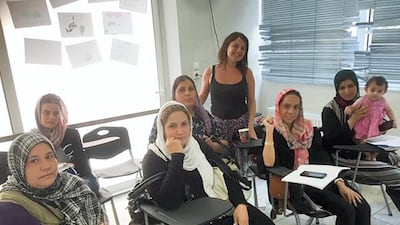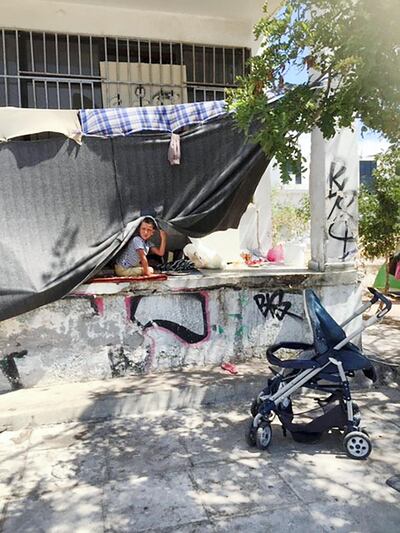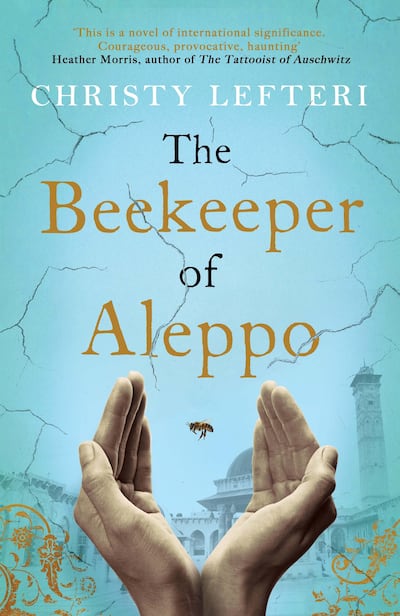We’ve seen this heartbreaking story hundreds of times over the past decade. Earlier this week, the Lebanese army tried to rescue a group of eight Syrian refugees travelling on a boat that had sunk off the coast of Lebanon as it was making its way to Cyprus. To date, five people still remain unaccounted for. It’s a route fraught with peril – last September, a five-year-old boy died on the crossing. But the smugglers and the desperate refugees still make the journey, as they have done in their thousands – perhaps hundreds of thousands – for the past eight years.
How does all this appear from the other end, though? What do people in Cyprus, Germany, Denmark and the UK see? Numbers. Huge numbers. "I don't blame them for that," says British author Christy Lefteri, whose important and moving new novel The Beekeeper of Aleppo tracks Syrian couple Nuri and Afra on a perilous journey from their shattered home town to, eventually, the United Kingdom.
“There’s been quite a lot of research about how we find it difficult to empathise with bigger groups of people as opposed to one person, a family or a couple. So seeing thousands of refugees on the news becomes just a mass of people. What I wanted to do is write a book about the individuals, couples, families caught up in this, in the hope that a novel can touch people in a way a news story can’t.”
The Beekeeper of Aleppo is a novel about journeys – both physical in terms of the route Nuri and Afra must take to get to the UK and, just as importantly, their internal journey to some kind of peace through heartache, loss, grief and war.
And it started with a trip of Lefteri's own, to Cyprus to see her father. "I was sitting on the shore thinking about how safe I was and yet literally just across the water there was this war going on," she remembers. "I couldn't get that out of my head. My parents were refugees as well, so I grew up with this sense of what it means to leave your family and your home behind. So that day by the sea, I felt absolutely compelled to go and help."
Because she can speak Greek, Lefteri decided to go to Athens to work at a drop-in refugee centre for women and children. What she found there was startling – the showers she would clean were prized because it meant the refugees wouldn't be hosed down in the camps. Tea and biscuits became a huge part of the day because they started conversations. And those conversations became the basis for The Beekeeper of Aleppo.
"It was an overwhelming situation, and my instinct was that I had to write about it," she explains. "The more stories I heard, the more I got this sense that people couldn't function emotionally any more because of what they'd gone through. Some had completely stopped speaking because they were so traumatised. I must say, though, that it was never a case of 'now this would make a good novel …' I was completely caught up in the work I was doing. I just wanted to react in a thoughtful way to the emotions I was feeling."
And as you might expect from a writer who is also a trained psychotherapist, The Beekeeper of Aleppo is a very emotional and compassionate novel, too, but one that rarely trips over into sentimentality. After their son dies in Syria, Afra goes blind and Nuri shuts his feelings down, only motivated by caring for Afra and the prospect of finding his cousin in Yorkshire. In a clever twist, it's actually Nuri who needs the greatest help. Towards the end of the book, Afra says to him: "You think it's me that can't see."
"The whole way through Afra wants Nuri to dress her," says Lefteri. "I didn't explicitly explain why in the book, but really, she wants him to be close to her in that moment. Actually, she's able to dress herself. It's just that he has completely forgotten how to love her and she wants to help him remember. I lost my Mum a few years ago and found it difficult during that time to emotionally connect with people, to love people in the way I used to – so definitely I drew on my own experiences to think about what it must be like to suffer bigger traumas."
And though it's a story of loss, there is hope in love. This might sound corny, but Lefteri is keen to stress that this is what she saw in the refugee centre. "People literally held on to one another in order to survive and grow," she says. "It became so important to get that into the novel; Nuri only starts to heal when he connects with his wife again."
Despite the fact The Beekeeper of Aleppo went straight into the Top 10 in the UK on publication last week – "one bookshop told me they'd sold out almost immediately," she beams – Lefteri is more grateful that she's had such rich experiences with refugees in Greece.
“When I had to come back home I was really sad, because you were leaving people behind who you cared about and worried for. Certainly if I were in their situation I might crumble. But the courage that you see makes it all worthwhile. When I returned to the drop-in centre it had changed to a place where there were lessons in Greek, English, German, dance, art. People could have therapy there, or learn about their rights as refugees. And what a huge step that was from a chaotic drop-in centre.
“Anyway, the first year I went there was one young girl who was so traumatised she hardly spoke to anybody. When I went back, she was speaking Greek better than me. I was in awe of how she’d grown and developed. How can you witness that and it not affect you?”
Which, hopefully, will be the exact reaction that The Beekeeper of Aleppo elicits, too.
The Beekeeper of Aleppo, published by Zaffre, is out now.




